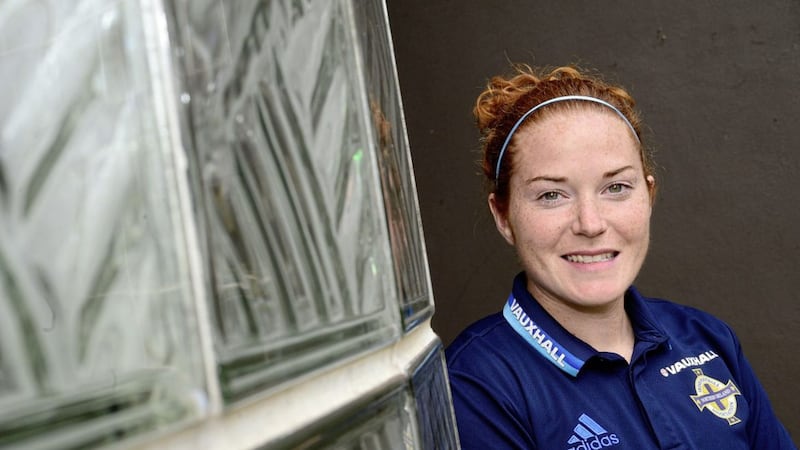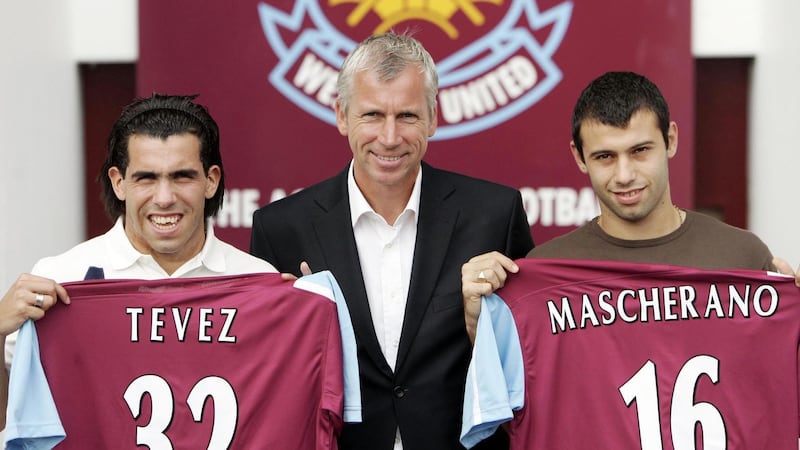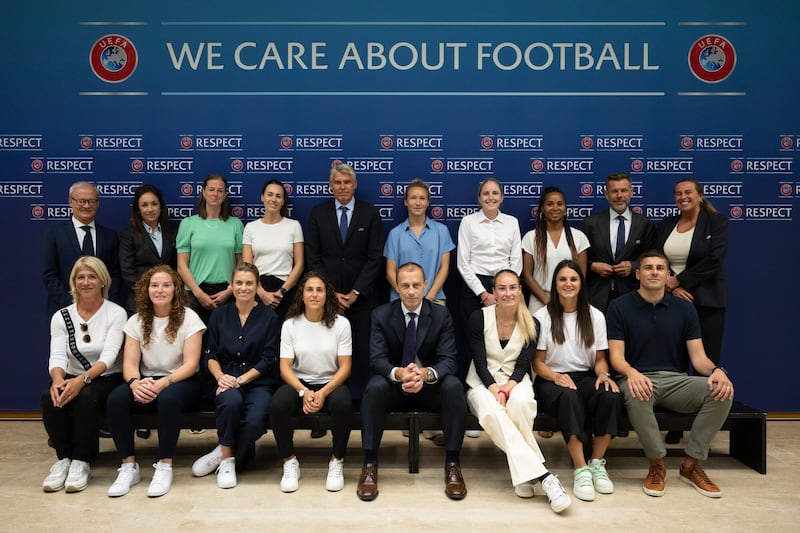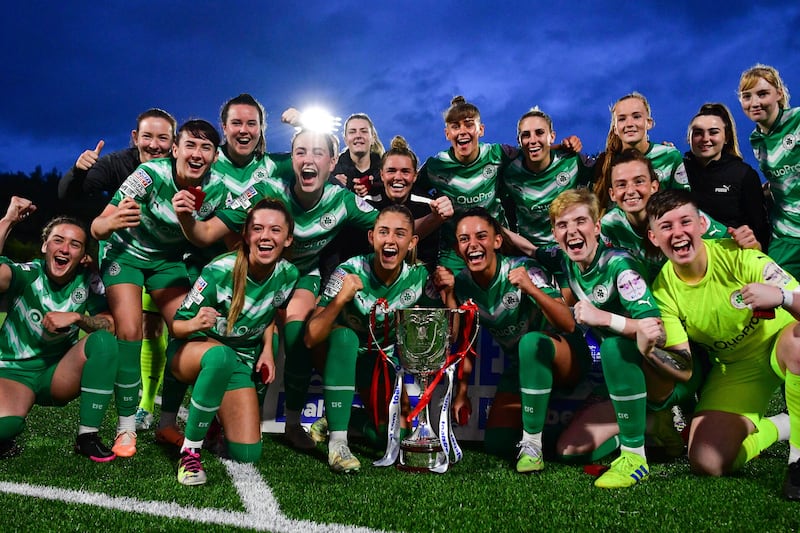AS part of a recent project, the P7 pupils of Strandtown primary school in east Belfast were tasked with writing a letter to their celebrity of choice. A couple opted for Harry Potter author JK Rowling, some wrote to characters from CBeebies or Blue Peter presenters.
One young lad went a step further and, rather impressively, chose to send his letter to David Baddiel, the English comedian and co-conspirator behind the Three Lions song that haunted football summers 22 years apart.
A letter also landed in the in-tray of Marissa Callaghan at Windsor Park.
The Northern Ireland ladies’ football captain smiled as she read down, enthusiasm leaping from the page.
“You know what?” she says, “it was the cutest thing ever. This wee girl was captain of her football team and she chose to write to me…”
The letter contained a couple of questions about Callaghan, about her life, her career. Callaghan thought about writing back then decided against it.
Instead she got in the car and travelled out to Strandtown PS last Tuesday, making a young girl’s year - never mind her day – in the process.
“I went over to the school and surprised her… her wee face,” beams the Cliftonville stalwart, “it was priceless, it really was.”
It’s amazing how big a difference such a simple gesture can make.
Callaghan knows all too well about the need for female role models to draw young girls to the beautiful game, having grown up in an era when they were few and far between.
“My daddy used to bring me to Celtic matches when I was a kid so Henrik Larsson would’ve been a big player, but obviously there was no real women role models back then. Not that you would have been aware of anyway… there was nobody really here that you could aspire to.
“That’s why it’s important for me now, as an older player, to hopefully be a role model for the young players coming through.
“Kids need to have that, and especially with the Northern Ireland ladies’ team at the minute, we have a couple of full-time professionals – the likes of Simone Magill [with Everton], Rachel Furness [with Reading]…
“Simone Magill came up through our programme, she played in this league and went over there for university, ended up signing for Everton and getting a full-time contract there.
“It’s players like that who younger players need to see, to hear their stories and hopefully aspire to be.”
Women's Football has never been so popular in Northern Ireland and we want to continue that trend!
— Official Irish FA (@OfficialIrishFA) April 12, 2019
Even Mary Quinn (@TaraLynneONeil1) from Derry Girls agrees....?? pic.twitter.com/IulPLLSJhy
Her own story is worth hearing too.
Growing up in Divis, she was always playing out in the street. Her brothers and sisters weren’t that interested but, for Marissa Callaghan, football made sense from the very start.
Youth leader Marty Foyle used to take her and anybody else who fancied it to the boys’ and girls’ tournaments at Maysfield leisure centre, before a link was established with Newington FC via Mickey Smyth.
Eventually Newington’s ladies team amalgamated with Cliftonville, leading to Callaghan’s long association with the Reds where – as player and ladies’ academy director - she remains the beating heart of the club both on and off the pitch.
Her international career didn’t take off quite as quickly, however, after two years spent on a football scholarship at a university in Alabama saw her return to Belfast with more questions than answers.
“For some strange reason, whenever I came home I decided I’d had enough. I don’t know why.
“I went out there to play football, I felt really good when I went out but in my first season I got red-shirted because I had an injury. That meant I didn’t play.
“In the second year then, I just couldn’t find my form; it was really warm and I just couldn’t adapt. I didn’t get the real experience so I ended up coming home.
“I still played for Cliftonville but in terms of the international set-up and that kind of thing, I just decided I wanted to play club football for fun – and that’s what I did do. It wasn’t until six years ago I got back into it, and it’s the best thing I’ve done.
“I was 26-27 at the time, it was one of those moments where I thought ‘if I don’t do this now, I never will - I’ll end up being too old and I’ll regret it’.
“In fairness to [former Northern Ireland boss] Alfie Wylie, he never gave up on me, he was at me all the time - ‘come on to training, come on to training’ - and eventually I did.
“I got my 50th cap there, so I can retire happy…”
At 33, she is far from finished yet, even if matching the 100-plus cap haul of Crusaders Strikers's Julie Nelson may be a tad ambitious.
Throughout her career, Callaghan has seen small but significant strides with each year that has passed. Take, for example, the launch of the new home Northern Ireland women’s fit kit.
For years they were running around in baggy men’s jerseys while some of their counterparts on the international stage oozed athleticism in fitted gear. Psychologically, all those little victories can add up.
“That was a massive thing for us,” says Callaghan.
“We would always have worn the men’s kit, and a lot of the time we were wearing medium men’s… I remember [Crusaders player] Danielle [McDowell] - she’s tiny, and it just drowned her.
“So it was really good to get a women’s fit kit. They’re only small things, but they make a difference. When you line out side to side against one of the big countries, they’re all nice and fitted, and they look fit because their kits fit, where we were all standing beside them with these big tops…
“There’s other things too. The association are starting to back the senior women’s team big time, they’ve even agreed that we’re going to get a match at Windsor Park each campaign.
“Our next qualifiers start in August so hopefully during that campaign we’ll get a match there and hopefully draw a load of youngsters to the game.”
Such positive anecdotes are great to hear, but Callaghan’s journey in the sport means she is around long enough to recall a time when attitudes towards ladies’ football weren’t so progressive.
The familiar jibes from those days remain fresh in her head and she knows that, while massive strides have been made in the local game, it would be foolish to think those kind of attitudes had disappeared completely.
However, Callaghan insists her own experience was generally a positive one, and should be a lesson for all young girls aiming to follow in her footsteps.
“You’d always have heard comments from people like ‘I couldn’t watch that women’s football’ or whatever but, I’m going to be totally honest with you, growing up I always got respect for playing.
“I don’t know if it’s because I was good at it, but I always got respect from boys in the streets and in school. Even when I was older and started working, people were genuinely impressed that I played, so I’ve had a lot of positive vibes.
“Whenever you’re a kid you get called a tomboy and stuff, but I was a tomboy so I didn’t mind.
“It didn’t bother me - that’s who I was.”
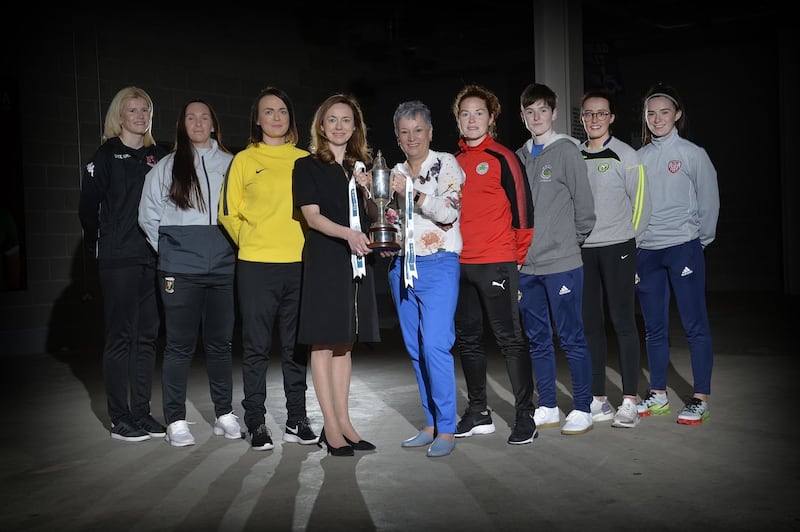
She was speaking at the launch of the Danske Bank Women’s Premiership at Windsor Park last week. Players and management from all seven top flight clubs were in attendance, as well as league officials and sponsors.
The ball starts rolling for Cliftonville tonight as the Reds begin the defence of the County Antrim Cup, with reigning league champions Linfield the visitors to Solitude.
It is a tough start yet, while the next game is always important, for Callaghan the focus remains firmly fixed on the next generation
Just yesterday the Irish Football Association (IFA) launched a new strategy aimed at boosting the development of girls’ and women’s football.
The new plan, which covers the period 2019-2024, sets ambitious targets to increase participation levels, with one of the key aims to double the number of registered female players from 1,600 to 3,200 over the next five years.
The strategic plan also provides a framework to strengthen women’s clubs and their volunteer base, improve infrastructure, promote leadership and effective governance and to encourage more women to take up coaching, refereeing or administration roles within the game.
That remains the big challenge, admits Callaghan. As a women’s football ambassador for the IFA, she sees the good work that is being done but knows the distance still to be travelled.
“We don’t have enough players playing in the grand scale of things, so we’re looking at participation and getting young players as young as four involved,” she said.
“The IFA has a shooting stars programme at the minute and it’s aimed towards kids between four and seven, trying to get them involved really early.
“The big thing we’re promoting is the fun aspect – come along, learn new skills and meet new friends. Obviously the football side is important, but at that age the main thing is the social side and the fun side of it; to give kids confidence, get them to meet people and take them out of their wee comfort zones.”
And for those young girls, just like the P7 pupil in Strandtown primary school last week, having an example like Marissa Callaghan to follow can only offer help them learn to love the game.
After all, it doesn’t seem so long ago that she was just one of the crew out kicking a ball in the streets around Divis.
“You know what we’re like here - you aspire to be a role model to these kids, but deep down I’m only a girl from west Belfast myself.
“I’m only a kid who played football in the street, there’s nothing special about me. It’s just hard work and enjoying the game that got me this far. If I can do it, so can anybody.”
